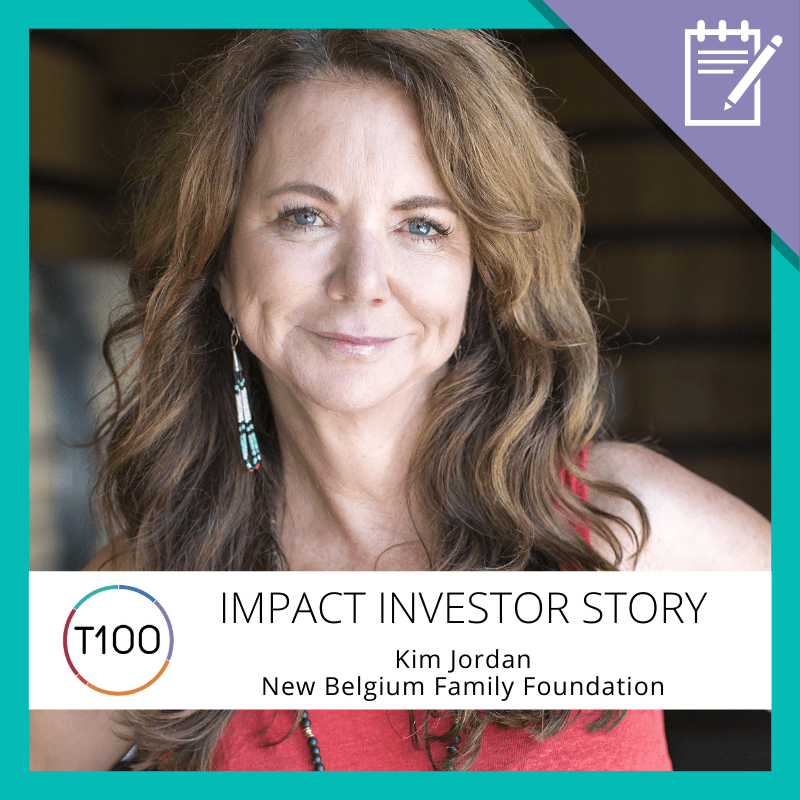Kim Jordan, New Belgium Family Foundation
Kim Jordan usually chooses the road less traveled. In the early 90’s, when she co-founded the New Belgium brewery in Fort Collins, Colorado, she entered a world that was totally unknown to her – the beer-brewing industry. The venture had started in a
basement, after she had met a young man who, while biking through Europe, had gotten acquainted with craft beer making. He would focus on production. She would manage the business.
Jordan, now 58, spent the next 22 years building New Belgium’s brand and “trying to make sure the business we owned was aligned with our values,” she says. Born in Rhode Island to a liberal family, it seems only natural to focus on protecting the environment and advocate at the local and national level on issues such as the minimum wage.
“We wanted to use the strength of our business and our brand,”
she simply states. Things could have continued the way they were. The brand had national recognition and New Belgium’s beer bottles featured examples of how the company reduced its carbon footprint with wind power and energy-saving technology.
Unconventional Management
New Belgium was also leading on the social front. The company initially gifted, then sold, shares of the company to its employees. Within a few years, the employees owned 41% of the company. Then, in 2012, Jordan and her “boys,” referring to her 31 and 24-year-old sons, sold the rest of the company to the employees. Part of the proceeds were used to launch the 15 million-dollar family foundation. Again, Jordan chose the path less traveled.
She hired someone “who didn’t know how to run a foundation,” she says, so that the foundation would not get in the rut of conventional philanthropic thinking. She laughs, referring to tensions that can occur in family foundations that have been managed in a traditional way for generations, “with advisors eager to post a level of returns they think shows their good work.” Indeed, such a traditional scheme was furthest from Jordan’s mind when she set up the New Belgium Family Foundation.
“A Good Start to Reset our Global Thinking”
While her personal portfolio is invested with the 100% philosophy, she is facing a few challenges implementing her vision for the New Belgium Family Foundation. Convincing her sons for starters. “If I am a 100 percenter, they are more like 92 percenters,” she admits. In any case, “I don’t know if anyone can ever say a portfolio is 100% impact invested,” she adds. “We are close, and what is certain is that
we are committed,” she concludes. Another snag the foundation encountered was the relative lack of deals aligned with Jordan’s impact objectives. “Finding high quality impact is still a challenge,” she underscores, “as well as building a portfolio where the impact investments can get similar returns to conventional investments on a broad and regular basis.”
If Jordan is cautious with the 100% impact claim, it is because she feels that impact investing is still a rather new discipline. She notes that there is a need for a clearer definition of what impact is, how it should be measured, and how the financial returns should be compared to conventional returns. “Though people need to decide for themselves what they want to do with their money,
transferring money into impact is a great signal that they do care about issues like social justice and the environment,” she argues, “and it is a good start to reset our global thinking.”
To resolve the deal flow challenges, the foundation hired an impact advisor and joined the Toniic network. Jordan points out that the network members are really interested in one another’s activities and collaborate on deals. “I find this extremely satisfying,” she explains, “it is not only what I do with my money for returns, but it is about being engaged in a community that has a purpose.”
The foundation’s investments are now beginning to align with what Jordan is passionate about – themes like renewables, and local and sustainable food systems. Jordan is also interested in investing in “liveable, walkable cities,” and wants to fund ways to “green” public transportation through the proliferation of bike lanes. While some of the deals the foundation is invested in are very early-stage, Jordan is patient and confident of a successful exit.
Jordan is also passionate about other social issues, like poverty alleviation and addressing disenfranchised youth. “These social challenges don’t always align with for-profit ventures,” she points out. But in harmony with her inclination for political and policy advocacy, she wants to find a tool that is “not exactly an NGO and not exactly a for-profit business.” “It would be an important tool to create,” she states. Creating a new tool, a new brand of impact investing? After having successfully launched and scaled a thriving business, Jordan is just the person to take on this challenge.

